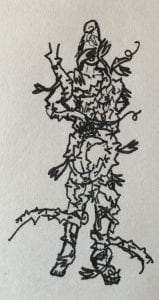Recently I got the privilege of going to see Nadia Bolz-Weber give an author talk about her book Shameless: A Sexual Reformation. The book talk was quite interesting and included a place for audience members to talk about shame and included a dance party. I think everyone left with something, including myself.
The day before this book talk, I’d been watching Big Mouth, the TV series created by Nick Kroll, et al., and it’d been the episode where the Shame Wizard was introduced. The Shame wizard, if you can’t guess, tries his best to shame the middle-school aged characters. Anyway. These two things occurring in my life as they did, got me thinking a lot about shame.

I’ve dealt with shame, particularly shame from times I’ve learned I didn’t know something seemingly everyone else knew. I’ve felt too ashamed to ask and would rather live in ignorance than turn to the internet. We all face shame. While shame looks different in all of us, based off our own lives, and often varies by gender, age, race, SES; shame is something that effects all people.
Where dose shame come from? Shame comes from society around us. The subtle or not so subtle ways that mentors and peers tell us how to behave, what is good, bad, and what is shameful. As we grow older shame comes from ourselves. Shame can come from you, parents, peers, other adults in your life, school, possibly a place of worship or even pop culture.
And shame serves a purpose. In adolescence, shame may prevent us from reckless behavior, but on the other hand, makes the effects of gossip potently deadly (see Burleigh). As adults shame seems less permanent but may inhibit our ability to enjoy life and to live truthfully. When I’ve let go of my shame and asked questions instead of living in ignorance, the result surprises me. A person who was confident on what they were talking about a second ago suddenly realizes they don’t know what they were talking about so well. Or sometimes other people who were also going to live in ignorance are grateful that I asked, and the conversation is much better for it. What do we hide from each other because of shame? What don’t we do because of shame?
Author Nadia Bolz-Weber suggests that we should let go of our shame in order to live honestly. What shame will you let go?